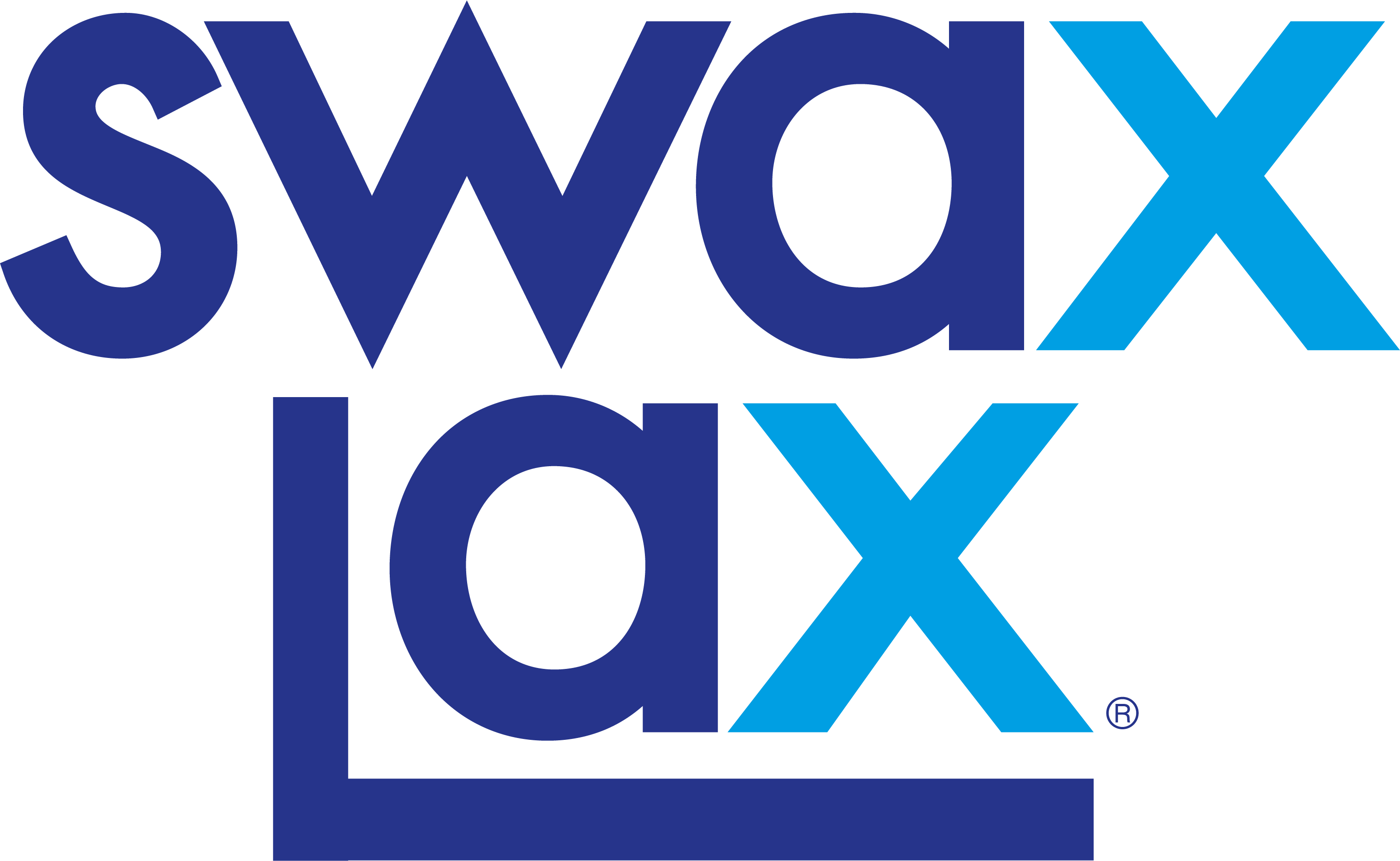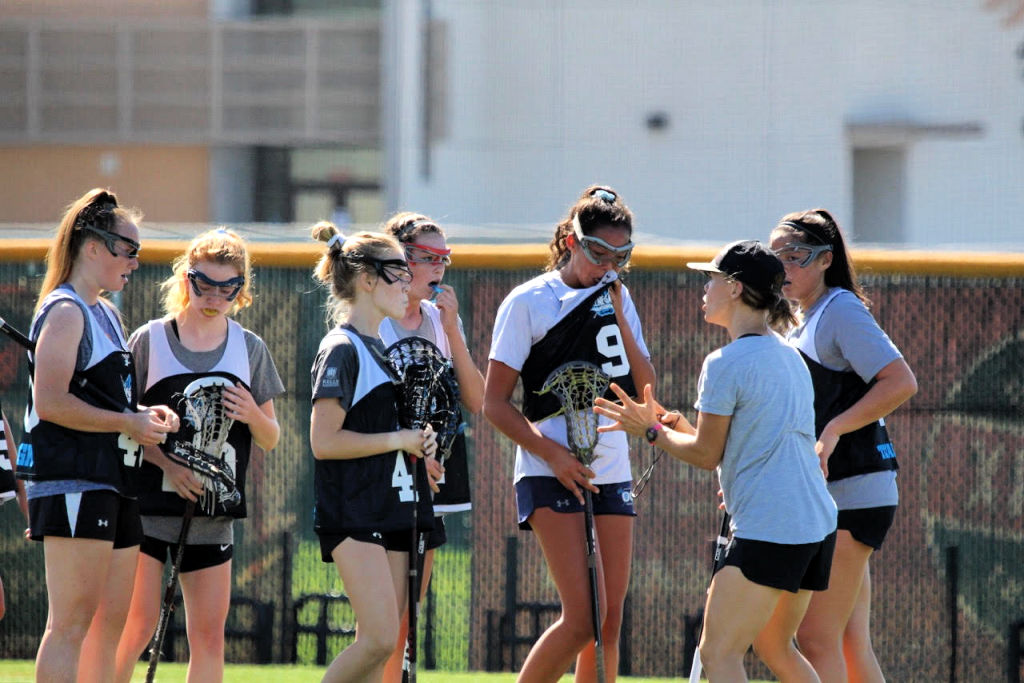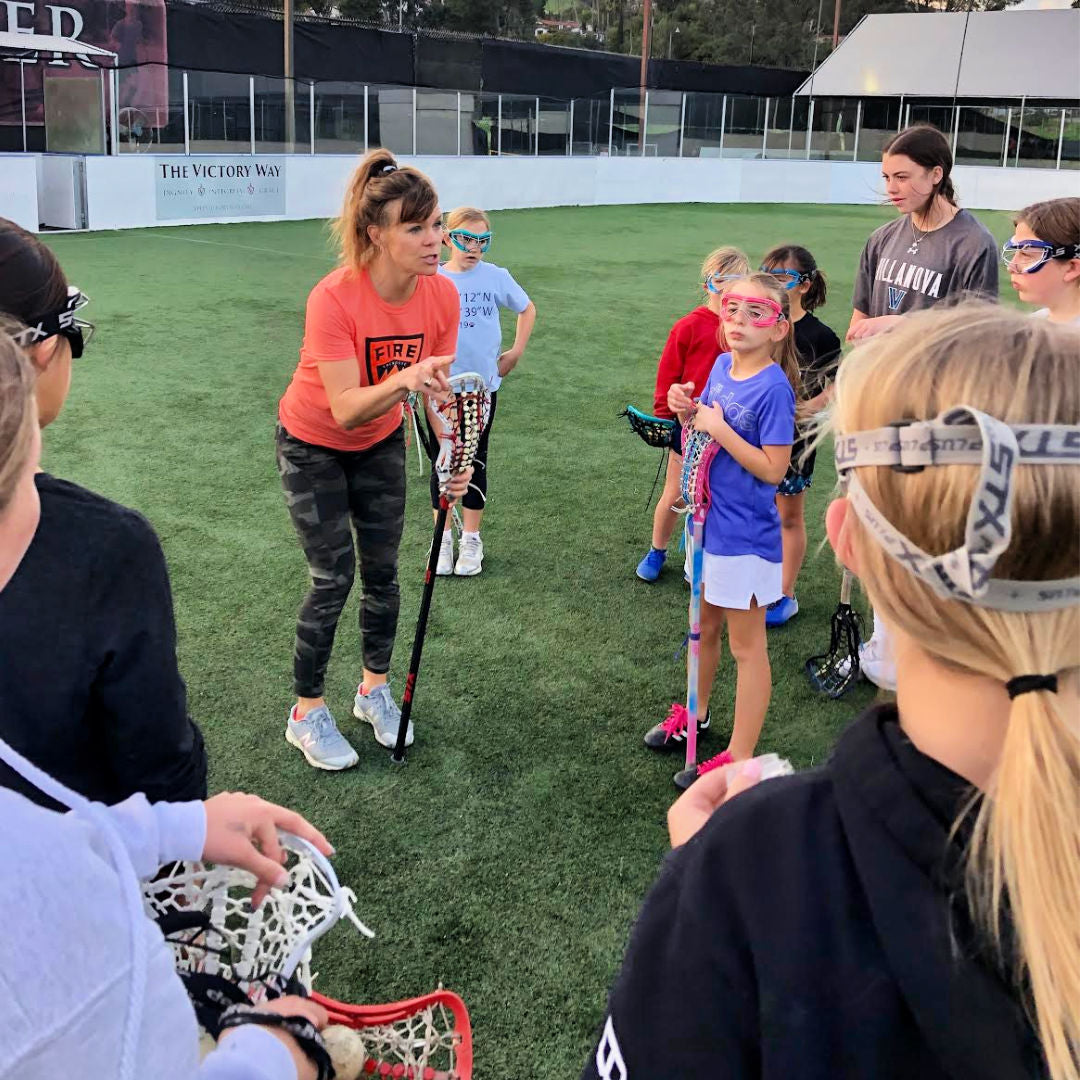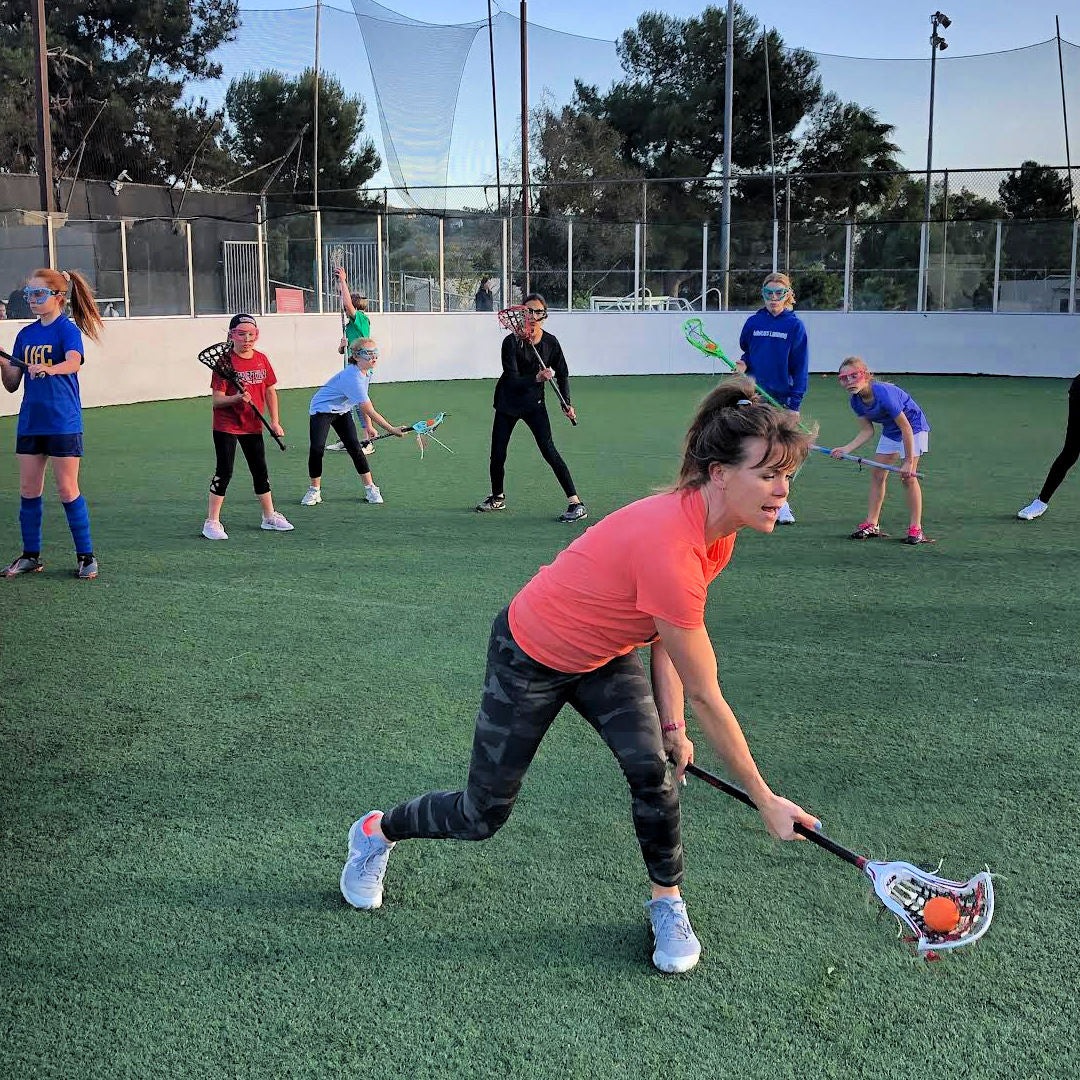Coaches on Coaching: Holly Reilly
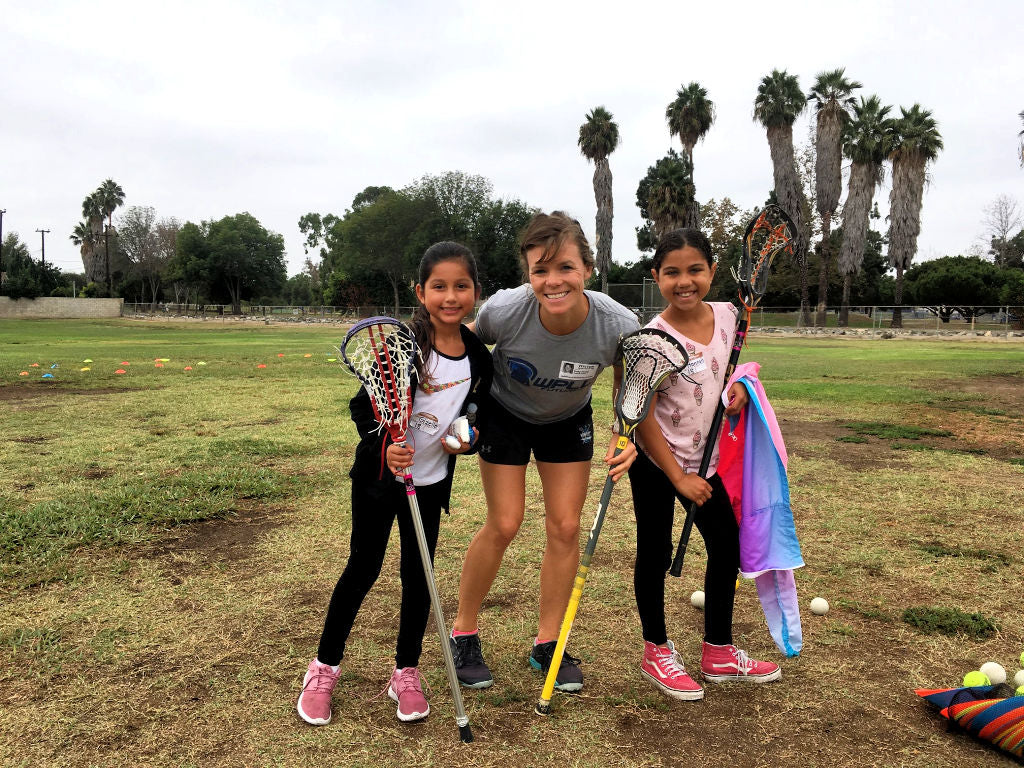
Holly Reilly, director of Renegade Lacrosse, is driven to train the next generation of women's lacrosse players. A three-sport standout at Shawnee High School in Medford, NJ, Holly went on to captain both the lacrosse and field hockey teams at Princeton University. She was twice named first-team All-American and also was the Ivy League co-Player of the Year in 2009.
From there, she joined the US Women's National Team, where she was a part of FIL World Championships in 2009 and 2013. In 2015, she played for the Boston Storm of the United Women’s Lacrosse League earning defensive All-Star honors, and in 2018 she competed with the Philadelphia Fire in the inaugural season of the Women’s Professional Lacrosse League.
As a high school coach for St. Margaret's Episcopal School, she led the Tartans to back-to-back Southern Section Championships in 2018 and 2019 earning 2018 Orange County Coach of the Year and 2019 NFHS Southern Section Coach of the Year Honors. She was recently named the 2019 NFHS Western States Girls Lacrosse Coach of the Year. Holly is the current Argentina Women's Lacrosse National Team Coach leading the South American women to their first World Championship appearance in 2021.
Holly resides in San Clemente, California with her husband and two sons, Finnegan and Liam.

Here’s what Coach Holly told us:
Coach Holly, with such an impressive resume, what insights can you give to aspiring athletes on the steps needed to find their level of success?
- Surround yourself with players better than you and compete to get to their level.
- Learn from your opponent every time.
- Play multiple sports.
- Seek out challenge as an opportunity to build confidence through trial and error.
- Approach your opponents and teammates as individuals who make you better, not your worst enemies.
- Be receptive to feedback and the possibility that there are multiple ways of executing a skill, being recruited, implementing a strategy. Be dynamic as a player!
- If you aren’t enjoying the sport, take a step back and find out why. Sports should be fun, exciting, enjoyable, and memorable!
You played both lacrosse and field hockey at Princeton. What are your thoughts on multi-sport athletics and the crossover benefits from field hockey to lacrosse?
- Most of the best athletes I have coached have played multiple sports, and I continue to be a huge proponent of multi-sport experiences.
- Game play is a great way to hone your competitiveness and playing multiple sports keeps you in game mode.
- Using different muscle groups in different motions reduces wear and tear and also creates balance for the body.
- Some of my favorite drills have come from basketball or soccer coaches.
- Thanks to field hockey, I was a ground ball hoover, and that is the only reason I started at Princeton my freshman year — I could get the ball.
- In fall 2007, I was selected to the US Lacrosse National Training squad, and the training weekends overlapped with my Princeton Field Hockey schedule. I had to choose which to attend. It was a difficult decision, but I ultimately chose to play with my field hockey team. I risked being passed over for the upcoming 2009 World Cup Team selection, but it felt right for mind and body. I needed field hockey season to be able to put my all into lacrosse. I also felt that I had committed to my field hockey team first and that my hockey days would be over before my lacrosse days.
- This took a lot of trust and some of the US Team coaches did not agree, but they respected the decision. I trained as hard as I could and when US Team training rolled around in January, I was fresh. I wasn’t burnt out from six months of lacrosse training. I was hot off the field hockey field, in great shape, a little rusty on stick skills, but one of the hardest workers on the field who played with a do or die attitude.
- Players are concerned about “missing” a season, and I think this is bogus. If a coach is telling you that you shouldn’t branch out in the off-season, I question if this individual has your best interests in mind. Youth sports are about development, learning, and fun.
- My experiences as a dual-sport athlete are a huge influence on me, and I do believe that a highly sought after recruit is still capable of playing both.
Can you explain your philosophy at Renegade Lacrosse of Tough, Tenacious, and Thirsty?
Renegade is about coming together to learn the game through competitive play.
When I think about what made me successful as an athlete, I think about toughness — the importance of challenging my comfort zone and testing my limits.
At Renegade, we look for opportunities to push players. This might be:
- switching hands
- playing with a new partner
- doing push-ups when we need to communicate more
- hustling all over the field from water break to team huddle
- using language that is supportive, but constructive
For example, “Kate, I love that you used your left hand right there. We are not focused on the catch right now, we are focused on you trying.” Or “Brooke, I love how you jumped right back in the play when you lost the ball. Way to dig in.”
When I think about players who make the most improvement, I think about tenacity. We use competitive drills that engage a lot of girls physically. We make them battle for ground balls a lot. This builds competitiveness, we have a lot of fun doing it, and it makes them more physical. Girls who are feisty out on the field don’t give up. They work through failure. We endeavor to create training opportunities to develop a drive to persevere.
When I think about players who ultimately achieve success, I think about their thirst — their thirst to be great no matter what. This is a mentality. We approach learning as a process that is ongoing and that we need to find a way. At a Renegade training recently, we were double-booked for a field, so we were moved to an adjacent grass field. We then came to learn that the adjacent grass field was recently fertilized, so we couldn’t use it. The only remaining option was a 30x40 grass plot for 50+ players. I brought the girls in and said, “Ladies, this is a great opportunity to learn a life lesson. What do you do when life hands you lemons? You make lemonade. Today, we need to be flexible, but nothing is going to stop us from getting in good training.” We then brought it in for a team cheer. Having any field space in SoCal is a luxury, so the size of the field wasn’t really an issue, but it was that we kept getting bumped and had not planned on it. We try to lead by example that we will find a way.
What are the day-to-day learnings your female athletes can take away and put to use?
- Thumber not a pointer — when you make a mistake or you feel upset about an issue, instead of immediately pointing your finger at someone else or making excuses, hold that thumb up and point to yourself and ask, “How can I make this better?” “How can I take responsibility?” “How can I own my own improvement?”
- Competing with your partner makes both you and her better. When she pushes you, you turn and give her a big old “juicy-five” (high-five with pizazz!) and thank her for making you better.
- If we are dropping the ball/experiencing failure, we are finding ways and where to make ourselves better. This is part of the process. We need it in order to be successful.
- Every player at one point was new to the game. Remember this when you’re on the field with a novice player. Lift her up, support her development, so that she can feel welcome and play her best. Only if we all feel welcome and comfortable can we compete at the highest level.
What have been the challenges and joys of working in a new lacrosse culture to spread the game?
Challenges:
- Finding experienced and qualified coaches
- Recruiting girls who are already immersed in other year-round sports
- Developing the depth of players and training experiences necessary to prepare an athlete for DI level of play
- Convincing college coaches that SoCal players are legit
- Convincing players that we do play in the rain (kind of a joke, but kind of serious!)
Joys:
- Extremely exciting and rewarding to be a part of the growth of the SoCal game. Renegade launched youth leagues in Spring 2019 and already we have hundreds of players participating — girls love learning about the sport and trying something new!
- Training and witnessing some of the best players to ever come out of Orange County and play at the highest level!
- Working with committed coaches and adults in the area to think of new ways to develop the sport and let girls know what lacrosse is about!
- Developing youth athletes and teaching sportsmanship, competition, teamwork, hard work, risk-taking.
- Leaving a legacy and hopefully watching a player I have coached one day play in the Olympics or on Team USA.
What are the five key values a coach needs to be successful?
- Ability to build relationships with players (see the nuances on a team, understand team culture and be proactive about building a positive culture). This includes having tough conversations with players when/if necessary. This helps athletes understand their role and impact on a team. It can be positive or negative, and it is our responsibility to teach them how to positively impact their team/teammates.
- Respect for all participants (opponents, referees, parents, every player). I believe a coach needs to be a servant-leader and lead by example. If we coach with respect, our players will learn how to interact and play with respect. If we pick up trash after the game and set a standard, our players will do the same.
-
Can-do/Positive Mindset. How will a coach respond to challenge, to player injury, to player disqualification, to a cancelled game, to their team not “showing up” for a play-off match? Find your can-do attitude in these situations because then your players will play with that attitude.
In the 2019 Orange County HS Championships, our team won the semi-finals in a tight match-up, but unfortunately my co-captain and lead defender was unable to play in the following game for the County Championship. After the win and knowing her captain could not play in the next game, I received the following text from a freshman who we had been encouraging all season to play with fire, find her grrrrrr, get after it! The text read, “Hey Coach! Awesome win today, excited to come and practice this Monday. Just looking ahead to Wednesday’s game, and I wanted to let you know that I am willing and ready to play in any position needed. I will also try my best to work as hard as I can in any position you put me in. See you on Monday!!” This spoke to me. This said, we have told her she can do it and now she finally believes she can. Instead of freaking out that our captain could not play, our team had developed the fortitude to recognize what we could control the situation and make it happen in our own way. We won the game. - Set HIGH expectations. My high school coach, Sue Rudderow Murphy, always said, “Set expectations high, and they will rise.” As a coach, think about ways to challenge your team, then raise the bar one or two more notches. See what your team is really made of. If it is a stick work drill, add defense. If it is a shooting drill, incorporate a lefty cut with trailing defense and water bottle target in the low right corner — push, push, push!
- Willingness to identify weaknesses as a coach and work to improve them. I have learned that playing and coaching are two different beasts and despite playing at the highest level, I must continue to develop and craft my coaching skills. Every year I try to attend a college lacrosse game and practice. I have been fortunate to watch Princeton, Stonybrook, Georgetown, and other high-power practices that challenge the way I run my teams and give me new ideas. I also believe in the power of abundance. What I mean is, rather than hoard drills and ideas, I enjoy exchanging drills and spreading the love. I learned this from my teaching days in South East DC — bag, borrow, and steal. Imitation is the highest form of flattery. Establish an open line of communication and feedback within your coaching staff. Hold bi-monthly meetings where you assess the strength of the coaching staff and areas of improvement. If you hold these meetings regularly, then it doesn’t feel like someone is in trouble. Instead, you are creating a culture where everyone, players and coaches included, strive for excellence and are receptive to feedback.
As a fan of Swax Lax, how do you use the brand to make fun, productive practices for your players?
- Swax Lax balls are a great tool for beginning players. I have found using these balls is much less intimidating to new players who aren’t so sure about a hard rubber ball zinging by their face!
- Try substituting Swax Lax balls for a normal practice with beginning players and during game play. Small box 2v2 or 3v3 really benefit with this ball because we waste less time chasing after a dropped pass.
- In the gym Swax Lax balls are great for indoor use. Stick work drills like a star drill or shuttles move more fluidly because balls are not bouncing haphazardly all over the place!
- Swax Lax is GREAT for training in the house! When I was growing up, my mom was always saying, “Go outside!!” Now, you can do stick tricks and cradling during Netflix commercials.
Include a Swax Lax ball to your athlete’s training routine — it will increase her confidence no matter her level!
